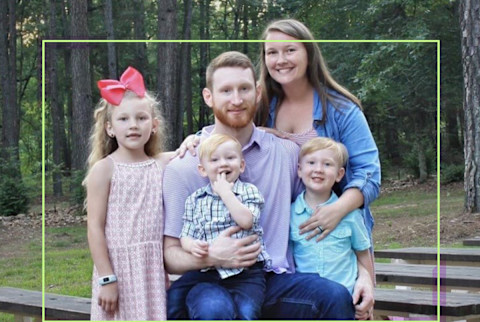I Was Diagnosed With Myocarditis After Mistaking The Symptoms For COVID-19

I was exposed to COVID-19 on New Year's Eve. The very first day back in the new year I was working from home, staring at a computer all day and my first COVID symptom emerged—a headache, which I chalked up to excess screen time.
But that night, shortness of breath woke me up. It wasn't severe, but I was definitely fighting for air.
How it began.
In addition to shortness of breath, my symptoms included headache and fever—but it just felt like a head cold to begin with. Once I tested positive for COVID, I started quarantining in my office to stay away from my three small children and my wife.
Fast-forward 24 hours and I started to experience chest pain that I simply attributed to being another symptom. It felt like heartburn that wouldn't go away, so I made a telehealth appointment with a doctor, who agreed that COVID was the likely culprit.
When my symptoms took a turn.
That night, I started to experience severe pain. I began to have symptoms that mimicked a heart attack: My legs went numb, my hands and feet were tingling, and I was struggling to breathe. About two minutes later, I started dry heaving, although I had eaten hardly anything that day.
Once that passed, I tried to get some rest, but I could only stay asleep for 15 to 20 minutes before my body would wake me up again.
Even in that moment when I was feeling my worst, I was worried about my family. I didn't want my wife to wake up the kids and have them see their dad in the state I was in—I wanted to guard them from feeling scared.
So at 4 a.m., I called an ambulance, and they brought me to the hospital, where I immediately had an EKG. After that, I also had a CT scan, and they admitted me to the hospital.
The diagnosis.
After an additional ultrasound, the doctor came in and asked me to get my wife on the phone. My heart sank because the doctor doesn't care to inform your wife unless it's something severe. He told her, "Your husband's heart is not functioning properly. It's doing fair right now, but we're not sure how much longer that will last." I was diagnosed with myocarditis, or inflammation of the heart.
At that point my resting heart rate was at 130, when typically it falls between 65 to 75. It felt like I was running a race. I wasn't doing anything, but my heart was pounding, and breathing became really difficult. I later found out that my heart wasn't pumping blood to the rest of my body and all of my organs were shutting down.
During surgery, they fitted me with an Impella 5.5 heart pump, and that without a doubt saved my life.
The recovery process.
It took about a month to fully recover. My heart felt fine, but my body was weak because I'd been cooped up in a hospital bed for three weeks. I'm still on medication to make sure that I don't regress, but I've already played a full season of softball since.
While I was still in the hospital, once I got to the point where I didn't look like a train wreck, I FaceTimed my kids to stay connected. Also, there was one day when the kids visited their grandma's hotel room, which was right across the street from the hospital, with a direct view of my room. Even though I was still really weak, I waved to them through the big window in my room—they were so excited to see that.
As I started to get stronger, my two older two kids were able to visit me in the hospital. I was actually able to hug them and explain the situation, which was an educational moment for them.
Now, I'm pretty much back to normal: playing sports, working around the house, floating around with the kids, taking them on bike rides. We're doing all the things we were doing together beforehand; the only caveat to that is I'm still considered a heart failure patient—even though I don't feel like one.
My biggest takeaway.
When I was in the hospital and feeling weak, it was easy to think: "This sucks for me. I hate that I'm going through it." But as I started to recover, my mindset shifted to: "It's such a blessing, in some regards, that it's happened to me." I'm grateful to be a success story, and I hope my experience will help lead to surgeons saving even more lives.
At the end of the day, my best advice is to not ignore any abnormal or unexpected symptoms. Each one is a sign from your body that something may be off, and you have to keep fighting for yourself and for your health.

